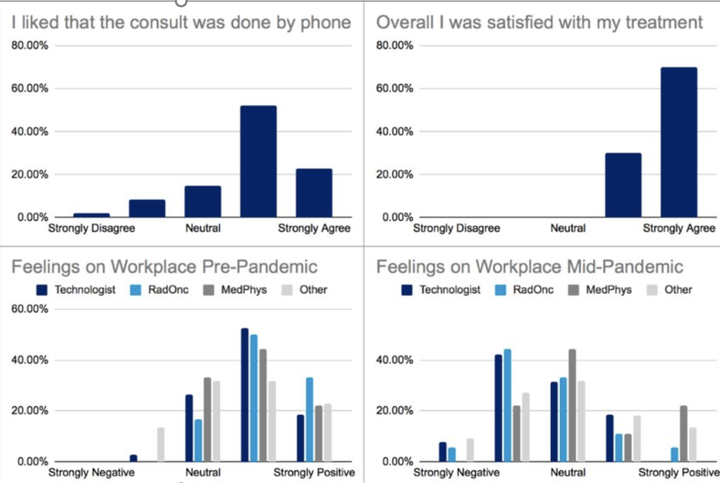Delivering Cancer Care During a Pandemic - Patient and Healthcare Staff Experience in a High-Volume Radiation Oncology Department
 Image credit: Haley Patrick
Image credit: Haley PatrickAbstract
Purpose/Objective(s) The COVID-19 pandemic has shifted practices in oncology to prioritize patient and healthcare staff safety while maintaining necessary treatment delivery. We obtained feedback from both patients and healthcare staff on pandemic-based practices in our radiotherapy department to adapt policies and procedures to improve safety and quality of care. Materials/Methods We developed a piloted questionnaire which quantitatively and qualitatively assessed patients’ pandemic-related concerns and satisfaction with specific elements of their care. Adult patients treated at the start of the pandemic with an initial consultation via telehealth and received at least 5 outpatient fractions of radiotherapy were invited to complete the survey by telephone or online. We simultaneously provided an online survey to our healthcare staff including radiation technologists, oncologists, dosimetrists, physicists and allied health professionals regarding workplace conditions and perceived safety. Relative frequencies of categorical and ordinal responses were calculated, and Mann-Whitney-U tests and t-tests were used to compare response rates between subgroups. Results A total of 53 patients (48% of eligible individuals) and 87 staff (44% technologists, 21% radiation oncologists, 36% other) responded to the surveys. Most patients responded positively to telehealth and pandemic department procedures, and all (100%) reported being satisfied with their treatment experience. Constructive criticism voiced in a minority of patients (13%) centered around hearing difficulties, appointment scheduling confusion, and a desire for access to more support services. In contrast, satisfaction with working conditions significantly decreased from 69% to 24% among staff, especially among technologists and oncologists. Multiple staff identified sub-optimal shift-scheduling, interprofessional communication gaps, and uneven assignment of tasks as the primary contributors to decreased morale. Of all the professionals surveyed, technologists were the most negatively affected, reporting increased workload, decreased efficiency, and dissatisfaction with work scheduling. Conclusion Patients have responded positively to new pandemic-related policies in our radiotherapy department and report overall satisfaction with their care. While patient satisfaction is high, the pandemic has resulted in decreased morale and the perception of increased workload among healthcare workers. Results from this study have been used to identify barriers to workplace satisfaction and have led to implementation of changes. This study highlights the importance of seeking feedback from both patients and healthcare workers to understand the complexities at play in preserving the quality of patient care and the work environment as we continue to work in the current reality.